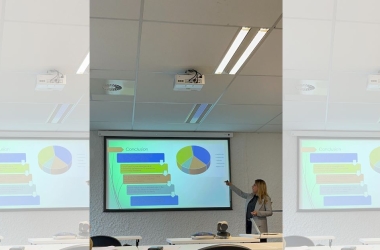Why Do Millennials Buy Fast Fashion Items? Wittenborg Student Investigates
Why Do Millennials Buy Fast Fashion Items? Wittenborg Student Investigates
Why Do Millennials Buy Fast Fashion Items? Wittenborg Student Investigates

The Influential Factors Guiding Millennials towards Fast Fashion Choices
On 1 December, Elham Barzegar, from Iran, presented her Graduation Assignment and Final Project (GA/FP) Oral Defence in Apeldoorn, shining a spotlight on environmentally unsustainable practices within the fast fashion industry.
The fast fashion industry, known for its swift production cycles and trend-centric approach, has faced scrutiny for its environmental impact. Barzegar, specialising in Digital Marketing and Communication within the Master of Business Management programme at Wittenborg, focused her final thesis on the purchasing decisions of international students – specifically Generation Y or millennials, as they are commonly referred to – at Wittenborg.
Barzegar's research reveals a significant gap in both academic and practitioner understanding of the factors influencing Generation Y's fast fashion purchasing decisions.
In exploring her chosen topic, Barzegar delves into intriguing questions that fuelled her curiosity, particularly about the fate of returned fast fashion items. Contrary to the assumption that returned items find a new home on a shelf, her research reveals a more alarming reality: "Do you know what happens to the returned fast fashion clothes that you buy online and then, for various reasons, send them back? The answer was shocking for me. They burn these items."
Under the supervision of Andreas Ooijer, Senior Lecturer at Wittenborg, Barzegar aimed to gain a profound understanding of Millennials and their decision-making processes to understand why they would buy a fast fashion item in the first place.

Various researchers and journalists, including from The Guardian, recently took a closer look at the impact of fast fashion on returns. They pointed out that return rates are higher for online purchases worldwide. In the United States, about 8-10% of sales from physical stores are returned, but for e-commerce purchases, it is much higher at 20-30%. Surprisingly, only half of the returned items are sold again, and many consumers fail to realise the environmental effects.
For this reason, Barzegar's ultimate goal emerged: to develop a marketing strategy to shift people away from fast fashion toward eco-friendly alternatives.
Employing qualitative methods, Barzegar conducted face-to-face interviews to establish a deeper connection with individuals and gain insights into their shopping habits. Her research encompasses various dimensions, including functional value, where pricing and quality are of significance. She emphasises, "It means that some criteria such as price, quality, promotion, giving a sense of satisfaction and more can play a significant role in people's purchasing decisions."
Referring to Yinyin et al.'s 2010 study, she emphasises the significant impact of pricing on fast fashion consumer decisions. On the contrary, Li and Huang's 2012 study on eco-friendly products suggests factors influencing 'green products' indicate that consumers with high environmental concern support 'green products' more and show greater readiness to choose them. This study concludes that the main influence factors on consumer choice behaviour regarding 'green products' include psychological benefit, desire for knowledge, novelty seeking, and specific conditions and do not include functional values, such as price and quality.
Barzegar also delves into emotional and social values. From her interviews, she gained valuable insights into different views on social value. Notably, social events – such as a birthday party or wedding – emerge as key moments that prompt people to realise the importance of specific clothing.
The study introduces a fresh perspective on conditional value, with 19 out of 20 participants explicitly noting its significance. Barzegar highlights the impact of promotions and discounts, showcasing their effectiveness in driving engagement and sales.
Despite thorough exploration, the study does not uncover a significant relationship between epistemic value and customer purchase decisions. Barzegar proposes that similar studies can aid businesses and marketers in gaining a better understanding of their target audience. Looking forward, she envisions expanding her research with a larger group to gather more robust data.
WUP 6/1/2024
by Erene Roux
©WUAS Press
653 words